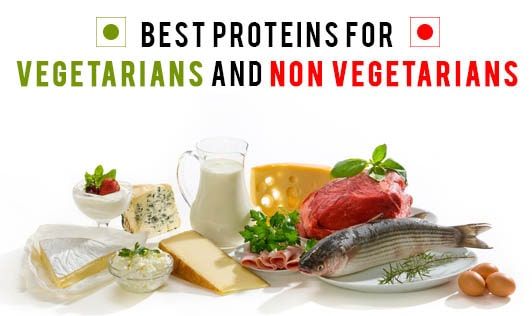Proteins are the building blocks of the body. They are required to build and repair tissues and cells, carry oxygen throughout the body, and for growth and development in children, teenagers, and pregnant women.
Benefits of Protein
Protein is an important component of pre and post-workout meals. Eating adequate protein not only helps in the repair and development of muscles and tissues but has many health benefits also.
- Provides satiety and helps you feel full
- Reduces appetite and hunger pangs
- Boosts metabolism and improves fat burning
- Helps maintain weight
- Strengthens immune system
- Helps lower blood pressure
- Prevents loss of muscles and improves muscle mass
- Keeps bones strong and reduces the risk of osteoporosis
- Helps the body repair itself after injury
Sources of Protein
There are numerous sources of proteins available through natural foods, but choosing the right source is important. And at the same time, quantity also matters. Here are a few tips that may help you:
- Spread out your protein intake throughout the day rather than being loaded up in a single meal or in a supplement.
- Your protein intake should not take up more than one-third of the plate.
Non-vegetarian Sources:
Non-vegetarians can choose lean forms of protein with minimal fat baggage. Lean animal sources include:
- Red meat without marbling
- Poultry without skin
- Fish and other seafood
The servings from these meat sources should not be more than 2 palm sizes a day.
Vegetarian Sources:
There is a common misconception that vegetarian foods lack proteins. But there are a lot of foods with good protein content for vegetarians. Some of the vegetarian sources of proteins include:
- Soy-based foods like tofu, roasted soy nuts
- Skimmed or low-fat dairy products like milk, cottage cheese
- Beans and legumes like chickpeas, kidney beans
- Lentils like arhar, urad, or moong
- Whole grains like quinoa
- Mixed Seeds like sesame, sunflower, poppy seeds
These are the healthiest foods on the planet that are economical, filling and easy to make.
Quality of Protein
There is an important thing for vegetarians to note when concerned about the quality of protein they consume. Unlike animal protein, plant proteins are ‘incomplete’, which means that they lack certain amino acids. Vegetarians can overcome this shortage by combining the aforementioned foods with other plant cereal proteins to obtain 'complete' proteins with all essential amino acids. Combinations like rice and sambar, rice and dal, roti and dal, idli and sambar, and chole bathure work best. These combinations of foods make vegetarian proteins complete.
Regardless of being vegetarian or non-vegetarian, it is important to eat food wisely and in the right combination.
